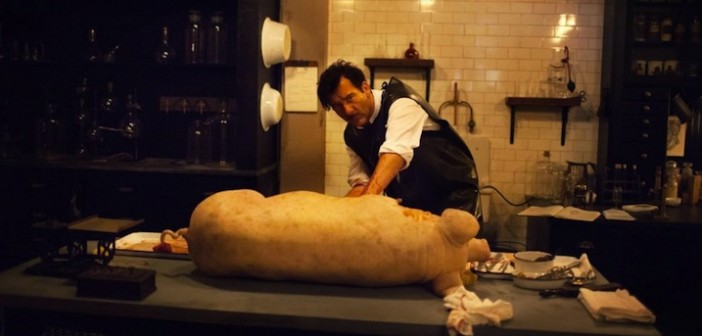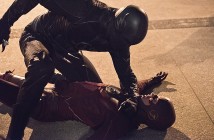The Knick is big. That goes for the show’s ambition and the physical size of the hospital in which the show takes place. Big enough for an underground African American hospital to be secretly run out of its boiler room, and big enough for the hospital’s manager to steal a body out of the morgue, unnoticed.
By its third episode, the characters have been constructed and given detail to the point where each has spread out onto his or her own track and become something of an allegory for the American experience.
John Thackery is ambition: Collapsing every vein in his body and slaughtering pigs in the name of progress. Showing an inhuman coldness and distance with the intention of doing what he can to save humanity, despite his acknowledgment that, no matter how great his efforts, whatever points he scores against death are harmless scratches in a blowout loss.
Algernon Edwards is perseverance: Despite his superior’s and “subordinates’” strong opposition to his presence—leading to near-banishment, forced to carry out menial procedures—Algernon constructs his own functioning mini hospital in the Knick’s basement (complete with a staff of coal shovelers and seamstresses) where he can practice surgery. He sacrifices for this: sleep, job security (though, what does he really have to lose?), and sobriety are all severely dialed back, lending to his episode-ending back-alley brawl (on the bright side, at least he’s getting his exercise). He’s taxing himself and doing work, just to be able to work, with no recognition.
Herman Barrow is weakness: He’s torn. On the one hand, he thoroughly wants the Knick to thrive as a respected health establishment. On the other, he thoroughly wants to watch a teenage girl strip down worriedly like she feels there’s a flea on her. Been there, guy. While we can’t be completely sure yet that this vice is directly responsible for the hospital’s financial woes, it certainly doesn’t help, and it’s not a good sign that his wife’s “stolen” pearl earrings went on the young prostitute’s ears and not into his top right drawer, where apparently all of the Knick’s funds are located.
Cornelia Robertson is the class divide: Though she means well—her life is basically committed to maintaining a hospital—she’s often ignorant of “real world” dealings, for instance, her miscalculation of the hospital staff’s acceptance of Dr. Edwards. It also took two rich family friends being struck with Typhoid for her to begin crusading against a possible outbreak.
Everett Gallinger is ignorance: He’s so committed to the notion that Algernon is beneath him that he’s stolen a paper he co-wrote in an attempt to learn a procedure for upcoming surgery. He has his wife try to translate it (of course, Mr. Paris Shoes co-wrote in French), and when all else fails, he refuses to acknowledge Dr. Edwards’ veracity and insists his credentials could only be a lie. Only when Thackery—he who only wants the hospital to thrive so that he may too—concludes that Algernon must know what he’s talking about does Gallinger allow for Dr. Edwards to walk him through the procedure.
Noticeably absent from this list of allegories is any semblance of male-female balance. But I think (hope) it’s both by design and only temporary: Sister Harriet’s—the nun who gives abortions—character seems to spell complication and controversy down the line; and the knowing Nurse Elkins continues secretly to develop a more comfortable bond with Thackery than the others in the Knick.
The biggest moment in the hour comes with 10 minutes remaining, when a few of these representations collide for one big metaphor.
Thackery performs a skin graft on a former lover, displaying the calm he would while operating on any faceless patient. With his own patient in dire need of surgical repair, Algernon must run from his basement operating theater to the Knick’s theater upstairs with his bloody hands held in front of him all the way through the building. Algernon interrupts the skin graft and has to use his teeth to grab silk for downstairs. Thack (ambition) informs Edwards (perseverance) that they’re going to need his unique knowledge to perform an upcoming surgery. Of course, the weight of the moment is limited by the fact that Algernon won’t be performing the surgery, at Gallinger’s (ignorance’s) insistence.
That’s progress in America.



